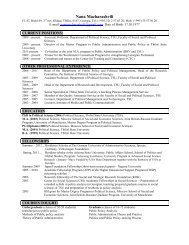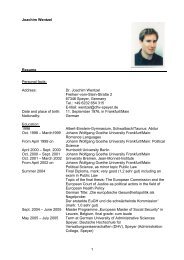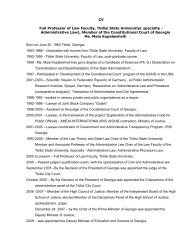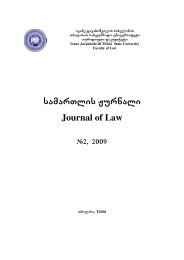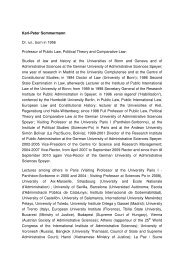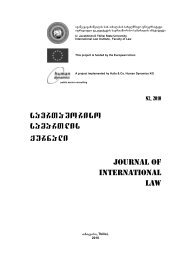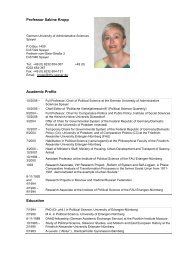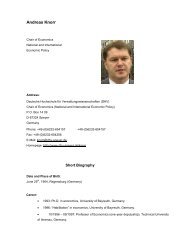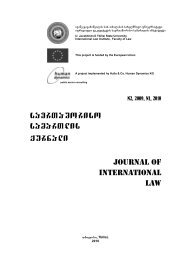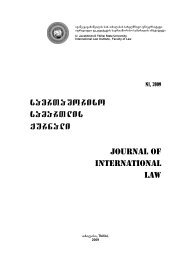Untitled
Untitled
Untitled
Create successful ePaper yourself
Turn your PDF publications into a flip-book with our unique Google optimized e-Paper software.
saerTaSoriso samarTlis Jurnali, #1, 2008 JOURNAL OF INTERNATIONAL LAW, N1, 2008<br />
GIVI MIKANADZE<br />
OMBUDSMAN INSTITUTION<br />
Human rights represent universal value.<br />
Cultural-historical eras, civilizations and political<br />
forces play considerable roles in their development.<br />
The concept of human rights derives from<br />
the natural law doctrine and embraces two<br />
main notions. The first implies that a human<br />
being is granted inviolable and inalienable<br />
rights. These moral rights originate from human<br />
nature of an individual and their purpose<br />
is to preserve the sense of self-esteem of a<br />
human being. The second notion of the concept<br />
of human rights embodies legal rights.<br />
They are established as a result of legal drafting<br />
processes which take place at both – national<br />
and international planes. These rights are<br />
based on the consent of those who shall enjoy<br />
these rights, i.e. of legal objects, whereas the<br />
rights affiliated to the first group are based on<br />
the natural order.<br />
Life and dignity of a human being have been<br />
trampled throughout the history. The idea of<br />
employing uniform norms without any discrimination<br />
towards each and every individual<br />
emerged several centuries ago. Indeed there<br />
is no society which would have no rules for<br />
protection of certain rights.<br />
Principle of equality of every member of<br />
human society, just alike many other basic<br />
principles, which make up what today calle<br />
human rights, are in principle attributable to<br />
all cultures, religions and philosophical traditions.<br />
One of such traditions, which derives<br />
from religion, is called jus naturale, or natural<br />
rights.<br />
Emergence and establishment of the term<br />
human rights was preceded with the notion of<br />
natural rights, widely accepted by XVII century<br />
philosophers and politicians. The concept<br />
of natural rights was on its turn related with<br />
the theory of natural law (lex naturale) elaborated<br />
by intellectuals of ancient era. “Inviolable”<br />
or “inalienable rights” were used as synonyms<br />
to the term “natural rights”.<br />
Jacques Maritain has noted with regard<br />
to natural law: Individual human being possesses<br />
rights solely due to the fact that he/<br />
she is a personality, integral master of himself<br />
and his actions. Thanks to the natural law a<br />
human being has a right to be respected, be a<br />
subject of rights, to possess rights. All of these<br />
are deserved by a human being due to a single<br />
reason of being a human.<br />
During XVIII century first incarnation of<br />
ideas related with the “natural rights” resulted<br />
into recognition of norms of “natural law” as<br />
legal norms. The mentioned norms became<br />
constituents of national constitutions first time<br />
in the history of mankind thus depicting contractual<br />
relationship between a state and an<br />
individual, deriving from which state authority<br />
was based on the consent of an independent<br />
individual. The 1776 United States Declaration<br />
of Independence and the 1789 French<br />
Declaration of the Rights of Man and Citizen<br />
derive from the above mentioned basis. In the<br />
subsequent period the principle was shared<br />
by a number of European, Latin American and<br />
Asian states, which escaped the fate of being<br />
colonialized.<br />
Despite all the above-mentioned, it can be<br />
rightly argued that human rights, as politicallegal<br />
phenomenon is a creature of new and<br />
modern history. It is universally recognized that<br />
each individual is granted rights and obligations<br />
prescribed by international law, and state<br />
on its turn is obliged to respect and protect<br />
these rights and freedoms. This standpoint is<br />
well reflected in the United Nations Charter, in<br />
the Preamble of which the Peoples of the United<br />
Nations have unanimously declared that<br />
they were determined to reaffirm faith in fundamental<br />
human rights, in the dignity and<br />
worth of the human person. United Nations is<br />
resolute to “promote and encourage respect<br />
for human rights and for fundamental freedoms<br />
for all without distinction as to race, sex, language,<br />
or religion”.<br />
182



